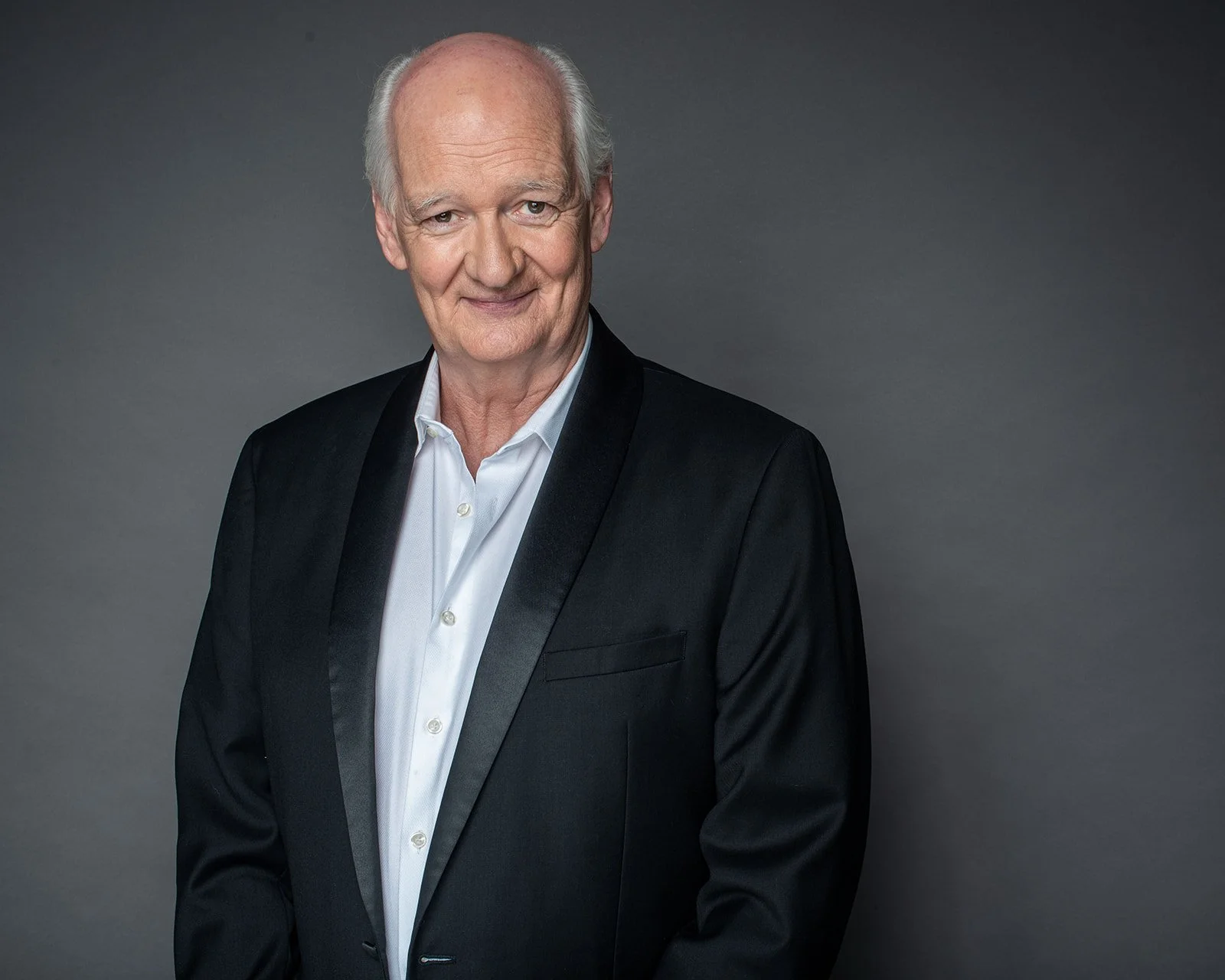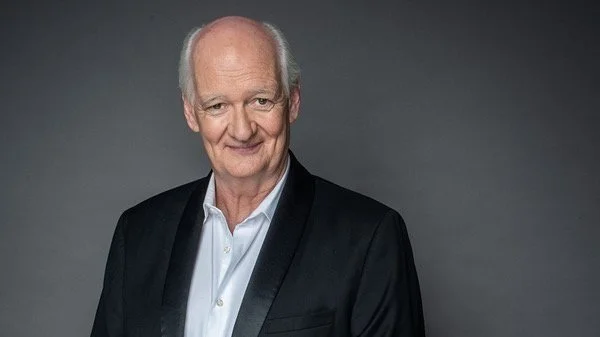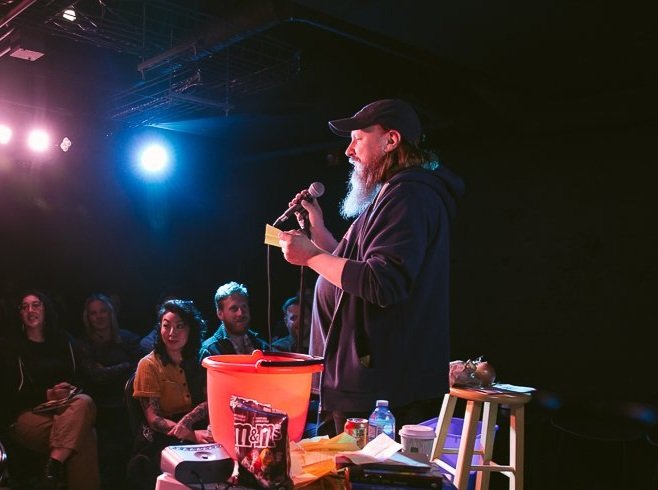Colin Mochrie reflects on his Vancouver roots ahead of return to Improv Centre
Molly Ringwald movies, ham waffles at Bino’s, D.O.A. concerts, and that night Dubya killed onstage: comedy star recalls highlights in a colourful career
Colin Mochrie. Photo by Helen Tansey-Sundari
The Return of Colin Mochrie is at the Improv Centre from June 4 to 6
COMEDY WILL TAKE YOU to some unexpected places. In 2007, Colin Mochrie found himself in the White House trading stories with the U.S. President. Skulking in the corner, if the Oval Office had corners, was VP Dick Cheney. “He was bent over rubbing his hands together like Mr. Burns,” recalls Mochrie. “It was freaky.”
Mochrie and his longtime improv partner Brad Sherwood had performed the previous night at the Radio and Television Correspondents Dinner, where they famously persuaded Karl Rove to rap for a minute or two. Their opener? George W. Bush.
“He did 20 minutes of standup,” says Mochrie. “And he had some good stuff! I mean, his vice-president shot a guy in the face so he had a lot of material to work with. And as he was doing it I turned to Brad and I said, ‘My God, his timing is impeccable, it’s really good!’ I thought: his publicity people should be marketing this guy. Incredibly charming, self-deprecating, very funny.”
Mochrie’s auspicious visit to DC—which included an encounter with a slightly insane Jon Voight, who invited Mochrie to join him on the set of the National Treasure sequel—is just one strange highlight in a long career that includes, of course, his run on both the U.K. and U.S. versions of the hit show Whose Line Is it Anyway?. But it all begins in 1985 in the modest port city of Vancouver, where the Studio 58 grad scored his first professional theatre role in She Stoops to Conquer at the Arts Club Review Stage on Granville Island
“And they were threatening to fire me,” he chuckles. “I was the juvenile lead but I got intimidated. I was working with a lot of the best actors in the city, one of whom—Antony Holland—was the head of my theatre program. A bunch of insecurities started building up and then the director, Larry Lillo, he took me out for coffee and said, ‘Look, I hired you because I saw something in the audition and I know you can do this. We’re having a run through this afternoon. Show me. Show me or I have to get someone else.’”
Mochrie managed to hang on to his part and credits Studio 58 with a lesson that still applies 40 years later. “That is when I learnt I did better in pressure situations than situations where I’m comfortable and should be fine,” says the actor, whose Return of Colin Mochrie brings him back to Granville Island for—no pressure!—five shows over three nights at the Improv Centre starting June 4.
The TheatreSports veteran is calling from his home in Toronto but he makes frequent visits to his old hometown—“My family is still there so I visit my mother on her birthday”—where he was raised next to Mountain View Cemetery in the Mochrie abode at 38th and Fraser. After getting the acting bug, Mochrie threw himself into his studies. “Basically our nightlife, soon as the show was over, we’d run to the Jolly Alderman across from City Hall, drink as many beers as we could—and I was underage at that point—and we’d go to Bino’s for a ham waffle. You can’t buy memories like this.”
This was a golden time for the city. Mochrie and his pals were partial to Doug and the Slugs and he witnessed one of the more self-defeating acts of Vancouver punk activism when he caught D.O.A. at “an anarchy fundraiser at Stanley Park.”
Anarchy fundraiser?
“The best part was the organizers had a basket of money,” he laughs, “and then Joey Shithead threw a match into it, started burning it, going, ‘Anarchy! Anarchy!’ You could see the fundraisers going, ‘Hmm, this is a bit of a drawback. Maybe we should have thought this out.’”
This was when Vancouver also produced a string of independent films that would find cult success in Europe like Big Meat Eater and Skip Tracer, which starred one of Mochrie’s TheatreSports colleagues, David Petersen. “And then I got to work with his brother, Eric Peterson, who is one of Canada’s treasures,” he adds. The city’s ties to Hollywood were tightening and around the same time that Nic Roeg was directing Gene Hackman in Eureka, Mochrie was making his film debut across from Molly Ringwald in Spacehunter: Adventures in the Forbidden Zone—a 3D film helmed by a director with one eye.
“And the other one wasn’t that strong,” quips Mochrie. “I was plucked out of the background extras and given a line where I capture her. ‘You can ask the chemist.’ That’s my line. Lamont Johnson, the one-eyed guy, he thought I looked the most threatening out of all the extras, so that tells you where his eyesight was at.
“The film industry was still fairly new then,” he continues. “We were in a big warehouse on Boundary Road and I just remember it was three inches of water and hundreds of extras. There was a scene where Peter Strauss and Molly Ringwald go into a cave and they’re supposed to get attacked by these bat people, but of course they didn’t have the bat costumes here so they had to send down to LA. And so the crates come up, they open the crates, and there was 50 fat costumes. You watch the movie and they go into a cave and there’s all these fat people hanging upside down. A very brave creative risk. They melted the suits a little bit so they looked mutant-ey. Fantastic!”
Less than a decade later, the bookish hopeful from Fraser East had made his way onto the hit U.K. show, Whose Line Is it Anyway? while the U.S. version would debut in 1998 starring Mochrie and pal Ryan Stiles. Born in Scotland and steeped in Brit comedy, Mochrie’s background presumably presented an advantage on both sides of the pond.
“I actually went to see two On the Buses movies,” he laughs. “Oh my God, we need help.” Was it tough adapting to different audiences?
Colin Mochrie onstage with the Improv Centre troupe.
“Sometimes North America gets a little precious about what improv is,” Mochrie suggests. “The British improvisers, their thing was: I wanna entertain you, I’m gonna make you laugh. They’d constantly break the fourth wall, talk to the audience and destroy the integrity of the scene, whatever, but they got laughs. So getting into that was fairly easy for me.”
America, predictably, meant a perpetual dance with the network censor.
“You could do anything on the British one,” he says. “There were F-bombs, people were doing unspeakable things to the Queen, it was all fine. In the U.S. there was censorship but you didn’t really know where the line was. In the first season I kissed Greg Proops on the lips and this voice came out of nowhere: ‘Excuse me, can you make something else up?’ We reached an agreement where we would just shoot the show and then the producer and the censor would meet afterwards and hammer out what they thought should stay. Another great showbiz moment was the producer coming up and saying, ‘Colin, we lost two pussies but we got a penis.’”
Audiences at the Return of Colin Mochrie might encounter two pussies and a penis but of course, it’s impossible for anyone to predict what will happen when he takes the stage again with the Improv Centre’s ensemble.
“No idea. All I know is that nobody knows. That’s the beauty of improv,” he says. “You just go out there and all you really have is commitment and hope that everything will go fine. And usually it does.”
Usually? Can he give us a percentage?
“Well, also, the beauty of improv is that it’s a win-win situation. It’s gangbusters if it goes great, and if it goes off the rails, it’s also good. It adds a little tension, a little excitement. ‘How will they get out of this?’ But I would say, at this point, maybe I’m up in the 90 percentile. I’m also really bad at math.” ![]()
























